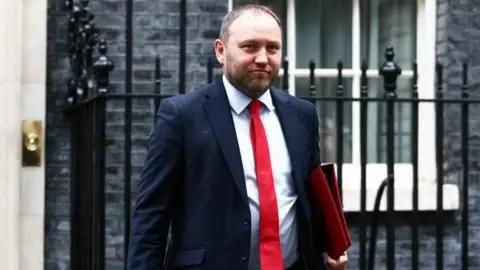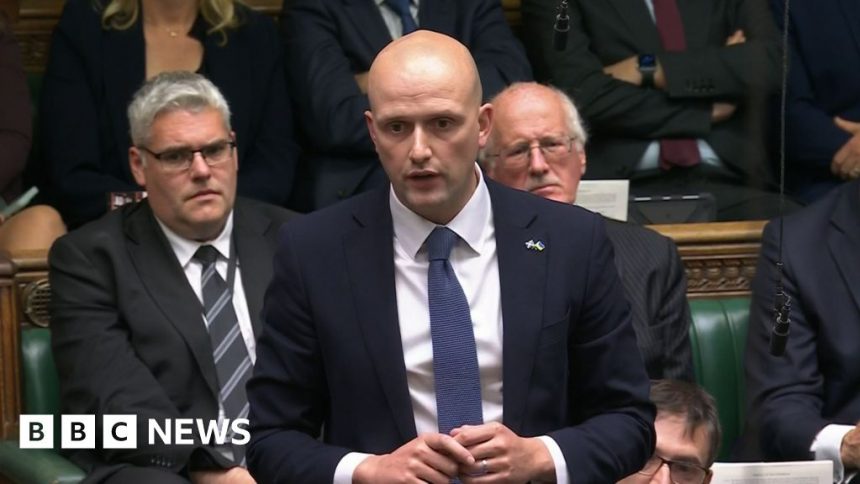SNP tables amendment to scrap two-child benefit cap
The SNP has tabled an amendment to the King’s Speech calling for the two-child benefit cap to be scrapped.
The party said the cap – which prevents most parents from claiming benefits for a third child – is “pushing thousands of Scottish children into poverty”.
Submitted by Westminster leader Stephen Flynn, the amendment is expected to be supported by MPs in Plaid Cymru, the Greens and independents including former Labour leader Jeremy Corbyn.
Keir Starmer faced pressure to reverse the policy in his programme for government on Wednesday – he later announced a taskforce aimed at tackling the increase in child poverty.
The UK government said there are now four million children living in poverty, an increase of 700,000 since 2010.
According to the latest figures from the Department of Work and Pensions, the two-child benefit cap affects 1.6 million children.
Mr Flynn called the policy a “disgrace” and said it must be “scrapped immediately”.
He said: “It’s shameful that Keir Starmer has made the political choice to continue imposing Tory austerity cuts, instead of delivering the change that people in Scotland were promised.
“The Labour government shouldn’t need a taskforce to find a conscience and do the right thing. This cynical attempt to kick the issue into the long grass won’t wash with voters.
“For every day that Starmer dithers and delays, more children will suffer the consequences of Labour inaction.”
Mr Flynn has also called on some of Scotland’s new Labour MP’s to vote for his amendment.
If chosen by the Speaker, it would go to a vote next week.
What is the two-child benefit cap?
Introduced by the Conservatives in 2017, the cap prevents parents from claiming universal credit or child tax credit for a third child, with a few exemptions.
These benefits help with the cost of raising a child. Parents and carers might be able to get them if their children are under 16 or, if they are in eligible training, up to the age of 20.
The sum they are given depends on their income, how many children are living with them, and their childcare costs.
The House of Commons Library published a report on the policy’s impact in February 2024, concluding “This continuing trend of increasing relative poverty has been driven almost entirely by rising poverty among households with three or more children.”
 PA Images
PA ImagesThe prime minister has faced pressure from within his own party to abolish the cap. Labour MP for Liverpool Riverside Kim Johnson also submitted an amendment to end the policy on Wednesday.
Scottish Labour leader Anas Sarwar and Deputy Leader Jackie Baillie have both said they want to see it scrapped. Previously Mr Sarwar said he would pressure the PM to ditch the policy if Labour won the election.
Meanwhile the Scottish secretary, Ian Murray, said his party wanted to get rid of the cap but they cannot afford to yet.
On Wednesday he told BBC Radio Scotland’s Drivetime programme: “The prime minister has said himself that he wants rid of this two-child benefit cap, he’s been pretty clear about that.
“The honest thing to say to the public is we will do this, we want to do it. It is something we want to get rid of but we cannot afford to do that and we won’t make a promise we cannot deliver.”
Ministers responsible for the new child poverty taskforce have met children’s charities and campaigners, who say scrapping the cap is the most cost-effective way of reducing child poverty.
Mr Murray added the government’s taskforce on child poverty and review of universal credit would have a “laser-like focus on making sure that poverty is eradicated in this country”.
Asked how long it would take, he said the government would have to grow the economy before it could invest in public services and deliver reforms.
“These things are going to take time. We can’t do everything overnight. We would like to do a lot of things that we can’t do because we’re hamstrung by the situation that we’ve inherited,” he said.
“We will do things as quickly as we can.”






